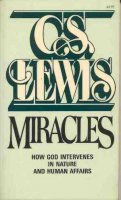 Miracles: A Preliminary Study by C. S. Lewis (Macmillan Books, 1978; first published 1947)
Miracles: A Preliminary Study by C. S. Lewis (Macmillan Books, 1978; first published 1947)
This is another book in my C. S. Lewis retrospective. It's hard to imagine that it has probably been 40 years or so since I read Miracles. I can't be sure, since I began keeping track of my reading only in 2010, but the book is covered with clear contact paper, a practice I used in college and for a little while thereafter. The cover is clean and almost new, but protecting it did not help the binding—many of the pages are falling out and I think I'm due for an upgrade.
If you're looking for a book full of examples of purported miracles—faith-healing stories out of Africa, perhaps, or an examination of testimonies from Lourdes—this is not your book. Lewis's approach is much more academic and philosophical, from careful definition of terms, to examination of the presuppositions inherent in different worldviews, to analysis of the type and function of various miracles in Christianity.
For me, the book started slowly, a bit of a slog. Lewis spends a great deal of time laying the philosophical groundwork for his study of miracles. Philosophy makes my head spin more than physics ever did, and I don't pretend to have a clear grasp of all his arguments. But I can testify that the end of the book is well worth the work at the beginning. The last three chapters, the Epilogue, and the two appendices are especially worthwhile. Here's the Table of Contents:
I didn't mark many quotations this time, and almost none in my favorite chapters—not because there was little worthwhile, but because it all hangs together in a way I find difficult to dissect into independent pieces. But here are a few.
From "Answers to Misgivings"
It is no accident that parents and schoolmasters so often tell us that they can stand any vice rather than lying, the lie being the only defensive weapon of the child.
If we are content to go back and become humble plain men obeying tradition, well. If we are ready to climb and struggle on till we become sages ourselves, better still. But the man who will neither obey wisdom in others nor adventure for her [that is, for wisdom] himself is fatal. A society where the simple many obey the few seers can live: a society where all were seers could live even more fully. But a society where the mass is still simple and the seers are no longer attended to can achieve only superficiality, baseness, ugliness, and in the end extinction.
From "A Chapter Not Strictly Necessary"
Everything becomes different when we recognize that Nature is a creature, a created thing, with its own particular tang or flavour…. It is not in her, but in Something far beyond her, that all lines meet and all contrasts are explained. It is no more baffling that the creature called Nature should be both fair and cruel than that the first man you meet in the train should be a dishonest grocer and a kind husband. For she is not the Absolute: she is one of the creatures, with her good points and her bad points and her own unmistakable flavour running through them all.
To say that God has created her is not to say that she is unreal, but precisely that she is real. Would you make God less creative than Shakespeare or Dickens? ... The theologians certainly tell us that He created Nature freely. They mean that He was not forced to do so by any external necessity. But we must not interpret freedom negatively, as if Nature were a mere construction of parts arbitrarily stuck together. God's creative freedom is to be conceived as the freedom of a poet: the freedom to create a consistent, positive thing with its own inimitable flavour.
From "Christianity and 'Religion'"
We who defend Christianity find ourselves constantly opposed not by the irreligion of our hearers but by their real religion. Speak about beauty, truth and goodness, or about a God who is simply the indwelling principle of these three, speak about a great spiritual force pervading all things, a common mind of which we are all parts, a pool of generalized spirituality to which we can all flow, and you will command friendly interest. But the temperature drops as soon as you mention a God who has purposes and performs particular actions, who does one thing and not another, a concrete, choosing, commanding, prohibiting God with a determinate character. People become embarrassed or angry. Such a conception seems to them primitive and crude and even irreverent. The popular "religion" excludes miracles because it excludes the "living God" of Christianity and believes instead in a kind of God who obviously would not do miracles, or indeed anything else.
The stillness in which the mystics approach [God] is intent and alert—at the opposite pole from sleep or reverie.
From "The Grand Miracle"
The central miracle asserted by Christians is the Incarnation. They say that God became Man. Every other miracle prepares for this, or exhibits this, or results from this. Just as every natural event is the manifestation at a particular place and moment of Nature’s total character, so every particular Christian miracle manifests at a particular place and moment the character and significance of the Incarnation. There is no question in Christianity of arbitrary interferences just scattered about. It relates not a series of disconnected raids on Nature but the various steps of a strategically coherent invasion—an invasion which intends complete conquest and “occupation.” The fitness, and therefore credibility, of the particular miracles depends on their relation to the Grand Miracle; all discussion of them in isolation from it is futile.


